How to Conquer Cowardice (Dante Read-Along)
Canto III (Inferno): The River Acheron (Week II)

Messenger Boy: Are the stories true? They say your mother was an immortal goddess. They say you can't be killed.
Achilles: I wouldn't be bothering with the shield then, would I?
Messenger Boy: The Thessalonian you're fighting... he's the biggest man I've ever seen. I wouldn't want to fight him.
Achilles: Thats why no-one will remember your name.
~ From 2004 film Troy
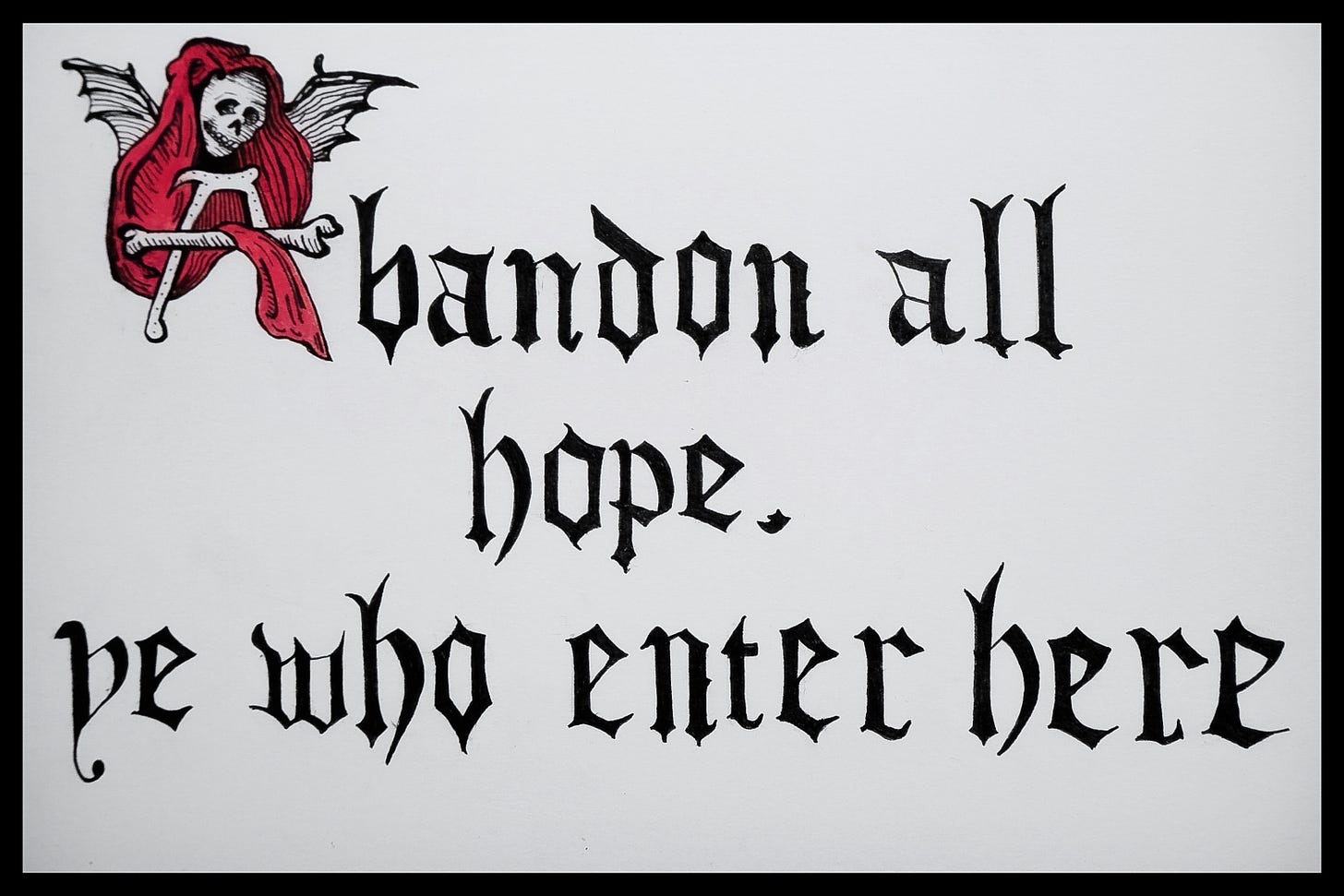
Welcome to Dante Read-Along!
(If this post appears truncated in your inbox you can read it on the web by clicking here. )
Welcome to Dante Read-Along, where you and I descend into Hell and Purgatory to be able to ascend to Paradise. Our guide is the great Roman poet Virgil and in this Third Canto we enter through the gates of Hell. You can find the main page of the read-long right here, reading schedule here, the list of characters here (coming soon), and the list of chat threads here.
In each post you can find a brief summary of the canto, spiritual (philosophical) exercises that you can draw from it, themes, character and symbolism explanations.
All wonderful illustrations are done specially for Dante read-along by one and only Luana Montebello.
This Week’s Circle ⭕️ :
Dante and Virgil come to the gates of Hell - They read the inscription - Dante hears the terrible cries of suffering - The Vestibule of Hell and the uncommitted - The uncommitted chase the banner and are tormented by flies and wasps - Dante and Virgil approach the river Acheron - They meet Charon the ferryman - Charon tries to turn them away - The shades of the damned clamor to get into his boat - They cross the river, and Dante faints after winds and earthquakes shake the ground.
Canto III: Summary 🌒
We begin with the inscription over the gates of Hell, and with the use of “me” in the phrasing, as if Hell were an entity and not just a place, Hell becomes very much alive. Justice is what provoked the creation of Hell: it is the balancing of the scales of personal responsibility, divine reckoning, or what we might call Karma.
As part of that inscription, the Christian Trinity is invoked in three names (III.5-6) - Divine Authority, Highest Wisdom, and Primal Love - as the makers of that realm.
Then those famous lines, “abandon every hope, who enter here” (III.9). Dante hesitates to enter, but Virgil counsels him to trust the journey and leave behind all cowardice and fear. Dante has not been banished to (or chosen) Hell so he does not need to fear the punishments. In the Aeneid VI.300, the Sibyl who is guiding Aeneas gives him a similar encouragement as he fears to enter the Underworld.
Virgil describes the inhabitants of Hell as “those who have lost the good of the intellect” (III.18).
This idea comes directly from St. Thomas Aquinas1 who says “Now as truth is the good of the intellect, so falsehood is its evil.” He is adapting an idea from Aristotle’s Nichomachian Ethics vi.2. Intellect here is not about being smart or clever, but to be one who is guided by reason, or to have - in the Stoic sense of animus - right mindset.
As Virgil led Dante forward through the gate, the “gladness on his face” (III.19), indicated that even amidst supposed misery, there is still the possibility of joy: Reason, as exemplified by Virgil, does not fear.
Dante wept at the cacophony of suffering that he encountered inside those gates; they had entered the Vestibule of Hell, modeled after Aeneas’ Underworld journey. Translator Allen Mandelbaum calls this spot “the miserable way.” In Virgil’s region of the unburied shades in the Aeneid VI, those who wander at the threshold are there because they had not been given the rite of passage to enter due to the lack of a consecrating funeral; for example, one who died at sea or in a foreign land. We will have a forthcoming essay on these Underworld journeys that inspired Dante, as found in Virgil and Homer, and in tales of Theseus and Hercules. This katabasis - or Underworld journey - has themes stretching across the ancient world.
In this Vestibule were those who lived “without disgrace and without praise” (III.35-36). These souls were vague and uncommitted in life, and while not accused of mortal error, still lived in indecision and ineffectiveness. Neither heaven nor hell would accept the cowardly who reside here, including the angels that did not take a side in Lucifer’s rebellion. Virgil councils Dante to pass these souls by, these souls that can never truly die due to this indecision, this lukewarm nature. They are envious of all the other fates.
The indecisive are found running mindlessly after a banner: According to translator Mark Musa, it is important to think about the form of punishment that souls are experiencing in the sense of contrapasso - in the Inferno, this means that the punishment they are undergoing is based on their error in life - so “the punishment fits the crime” so to speak. And yet we can think of it in a more philosophical sense as “reaping what they have sown.” So those running furiously after the banner - think of a flag or a standard - are compelled to follow, as they did not follow anything in life.
In this group, Dante saw a shade that he recognised, but is not named; the one “who made, through cowardice, the great refusal” (III.60). The identity of this character has been speculated over the ages as Pontius Pilate who washed his hands over making judgement on Jesus, as Pope Celestine V, who resigned after only five months as Pope in order to return - unsuccessfully - to a hermit’s life, or as Esau, son of Isaac in the Old Testament who sold his birthright for a bowl of stew.2
The pain and punishment of grotesque proportions that we will see again and again as we travel through the realms of Hell first become apparent here, with the image of the indecisive being bitten by flies and stung by hornets, the worms at their feet covered in their blood and tears.
Dante and Virgil arrive at the River Acheron, among shades who are eager to cross. Charon the ferryman rows to shore and tells Dante, the living, to stay away. Virgil rebukes Charon, telling him that Dante is granted this journey and is allowed to enter by divine command; it has been willed from above.

Here is one of Dante’s beautiful epic similes that we shall study as we move through each Canto. Dante’s is first, and next, a similar scene from Virgil’s Aeneid. Compare the language of the two, the first when Dante views the shades waiting to cross Acheron, the second, when Virgil describes the moment that Aeneas views the shores of Acheron:
As, in the autumn, leaves detach themselves,
first one and then the other, til the bough
sees all its fallen garments on the ground,
similarly, the evil seed of Adam
descended from the shoreline one by one,
when signaled, as a falcon - called - will come
Inferno III.112-117
A huge throng of the dead came streaming toward the banks:...
As thick as leaves in autumn woods at the first frost
that slip and float to earth, or dense as flocks of birds
that wing from the heaving sea to shore when winter’s chill
drives them over the waves to landfalls drenched in sunlight
Aeneid VI.348, 352-355
Charon ferries Dante and Virgil across the river as more shades gather on the bank for the next trip. Virgil explained that the souls on the shore are eager to cross “because celestial justice spurs them on / so that their fear is turned into desire” (III.125-126), as if through their willingness to live in error in life, they are now ever willing for the reward for that action.
Then, the vast dark plain beneath them shook as if an earthquake, the wind blew, and Dante, overcome, fell into a swoon.
💭 Philosophical Exercises:
When Dante sees the inscription above the gateway of Inferno, he tells his guide:
Master, their meaning is difficult for me,
Virgil begins his explanation to his companion, not by interpreting the meaning of the inscription, but by instructing him on how he should conduct himself moving forward. How he should act.
“Here one must leave behind all hesitation;
here every cowardice must meet its death.For we have reached the place of which I spoke,
where you will see the miserable people,
those who have lost the good of the intellect.”
This brings to mind the often-misattributed quote to Winston Churchill: ‘If you’re going through Hell, keep going.’ Interestingly enough Mandelbaum translates the word sospetto as hesitation, while Hollanders translate it as distrust, Ciardi as a division of spirit and only Longfellow translates it as suspicion, the closest word to the original Italian.
It is often said that reading poetry in translation is akin to committing a crime. However, in this case, examining the words chosen by different translators can reveal the truths that Dante wove into the original text.
Any hesitation, suspicion, distrust, division of spirit leads to indecision or returning to the shadowed forest that Dante has just escaped from. In fact, cowardice is a part of this doubt that can blossom in our hearts, inability to take firm action because our souls are not solid in themselves.
Poetry is made from words, and this scene contains yet another hidden gem.
And when, with gladness in his face, he placed
his hand upon my own, to comfort me,
he drew me in among the hidden things.
‘To comfort me’ - the Latin root of the word comfort means to fortify, to get stronger. Virgil placing his hand upon Dante’s is akin to our reason fortifying our soul. When we encounter something terrifying, understanding how to respond to it can bring a sense of calm, as clarity replaces fear with direction.
Side note: It is interesting that Virgil says that people in Hell have lost the good of their intellect to Dante, whose intellect also must've been impaired since he cannot comprehend the inscription on the gates of Inferno.
I. Dante’s first experience of Hell is not through sight but through sound.
Dante’s first experience in the ‘timeless air’ and ‘starless skies’ is entirely auditory. He can hear them, he can even smell them, but he is too blind to see them. It is only from the line 52 that he begins to see. Until then, he weeps, revealing his hesitation and doubt: does anyone truly deserve to endure the immense suffering witnessed in the Inferno?
‘The darkest places in hell are reserved for those who maintain their neutrality in times of moral crisis.’ ~ this quote, or translation - whoever authored it - has a beauty in itself. The term ‘darkest’ does not merely signify profound pain and suffering; in this context, it conveys an overwhelming darkness so intense that the souls here are completely hidden from view. The souls of neutrals do not even deserve to be lit up by the flames of Hell.
II. Dante’s First Sign of a Healthy Soul
Dante begins to see when he leans and strains his eyes and witnesses:
And I, looking more closely, saw a banner
that, as it wheeled about, raced on—so quick
that any respite seemed unsuited to it.…
After I had identified a few,
I saw and recognised the shade of him
who made, through cowardice, the great refusal.At once I understood with certainty:
this company contained the cowardly,
hateful to God and to His enemies.
Certainty - we mentioned that one should abandon hesitation, suspicion and distrust before entering Hell. Dante does not merely understand when he looks a the predicament of 'neutrals’ but he understands with certainty, with no hesitation or doubt, why they are here.
III. Lacking Inner Stimulation
The more I read Dante, the more I am struck by his profound understanding of the human psyche. Each line is so vividly crafted that I feel like a silent observer, a third presence watching as the neutrals are relentlessly stung by horseflies and wasps.
Of course, we can again connect this to the neutral souls, who are neither evil nor good, but we could also observe this as a lacking the desire to live. There is a clear contrast between those who choose to end their lives in despair (suicide) and those who reject life out of sloth (more on them later in our read-along). The neutrals merely exist. Their lack of inner drive isn’t due to “laziness,” but rather a contentment in simply existing without purpose or passion, without choice.
IV. Distraction is also a type of cowardice and hesitation.
Dante barely finishes his certain understanding of why neutrals are where they are when his mind begins to rush and he ‘looks beyond’ at the crowd of souls at the shore of the river Acheron. He once again does not hesitate to ask his master to explain, but Virgil reprimands him:
When we have stopped along
the melancholy shore of Acheron,
then all these matters will be plain to you.At that, with eyes ashamed, downcast, and fearing
that what I said had given him offense,
I did not speak until we reached the river.
How much does this remind myself of my own mind! Rushing, jumping ahead, impatience is also a kind of cowardice.
V. Weeping and Losing Consciousness
Dante loses his consciousness (or falls asleep) at the end of this canto. I would like to draw your attention to these moments of when Dante weeps or loses his senses, he is obviously overwhelmed. His mind, soul, intellect were full of deep sleep but become stronger as he progresses.
This Week’s Sinners and Virtuous 🎭
(Themes, Quotes, Terms and Characters)
Themes 🖼️ :
The good of intellect.
In our modern age, we often regard intellect as inherently “good.” However, intellect in the hands of a corrupt soul (or consciousness) can be wielded to cause harm. To paraphrase the Stoics: “Intellect itself is neither good nor bad; it is how we use it that truly matters.”
(Of course, for Dante the good of intellect is inseparable from God)
Hell is not eternal, it is sempiternal.
This means that Hell didn’t exist forever, but it had a beginning and will last forever. There is a debate of when exactly God created it. Was it when the angels rebelled or was it with the original sin? This is a topic for theologians to debate.
Hateful to God and to His enemies.
It is curious to witness a kind of a “union” (for the lack of better word) between God and his foes here.
both justice and compassion must disdain them;
(line 50)
Justice (Hell) and Compassion (Heaven) are both rejecting these souls.
Contrapasso
The entire Inferno is based on contrapasso which means that every sinner suffers the reverse punishment of what he was guilty of whilst alive. In the case of neutrals, their lack of inner-stimulation is countered by wasps continuously, endlessly stinging them.
Quotes 🖋️
(The ones I keep in my journal as reminders of eternal wisdom):
Those who are here can place no hope in death,
and their blind life is so abject that they
are envious of every other fate.The world will let no fame of theirs endure;
both justice and compassion must disdain them;
let us not talk of them, but look and pass.(lines 46-51, Mandelbaum)
Terms:
Katabasis - A journey to the Underworld
Characters:
- Sibyl - The prophetesses of the Oracle of Apollo, they were sought out for oracles and predictions. In Virgil’s Aeneid, Aeneas was led through the Underworld by a Sibyl.
- Aeneas - The title character of Virgil’s epic poem the Aeneid. Aeneas took a journey into the Underworld, guided by a Sibyl, and that journey was a model for Dante in creating the architecture of Hell.
- St. Thomas Aquinas - Master theologian of the Catholic faith, his influence on medieval philosophy and theology through his work Summa Theologica is wide reaching.
- Aristotle - Renowned philosopher of Antiquity, student of Plato. His works were the foundation of medieval philosophy.
- Homer - Poet of antiquity, author of the Iliad and the Odyssey, the great epic poems revolving around the Trojan War and the wanderings of Odysseus.
- Theseus - A Greek hero of antiquity and myth, he is one of the few who journeyed while still alive into the Underworld in an attempt to abduct Persephone as a bride for his friend Pirithous.
- Hercules - Hero of classical Greek myth, Hercules was one of the few who journeyed alive into the Underworld when, during his Twelve Labors, he had to thieve away Cerberus.
- Acheron - One of the many rivers in Hell, the Acheron is the boundary that must be crossed over with the ferryman Charon from the Vestibule of Hell into Limbo and on into the deeper circles of Hell.
- Charon - The ferryman of myth who rows the shades of the dead from the outer Vestibule into the deeper levels of Hell.
St. Thomas Aquinas, Summa Theologica I.94.ii
Genesis 29:25-34

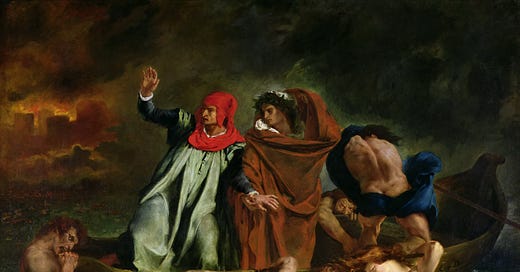






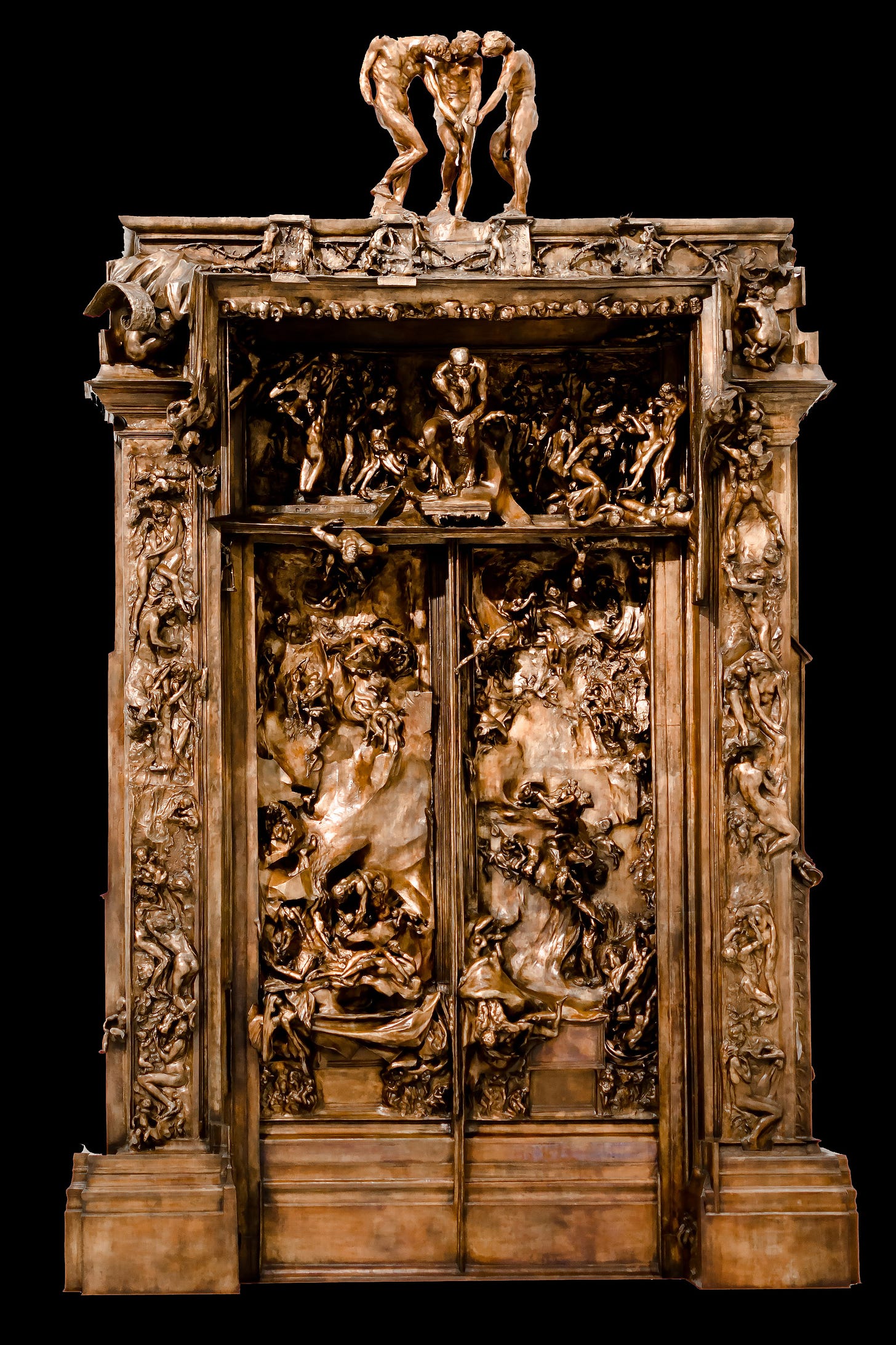

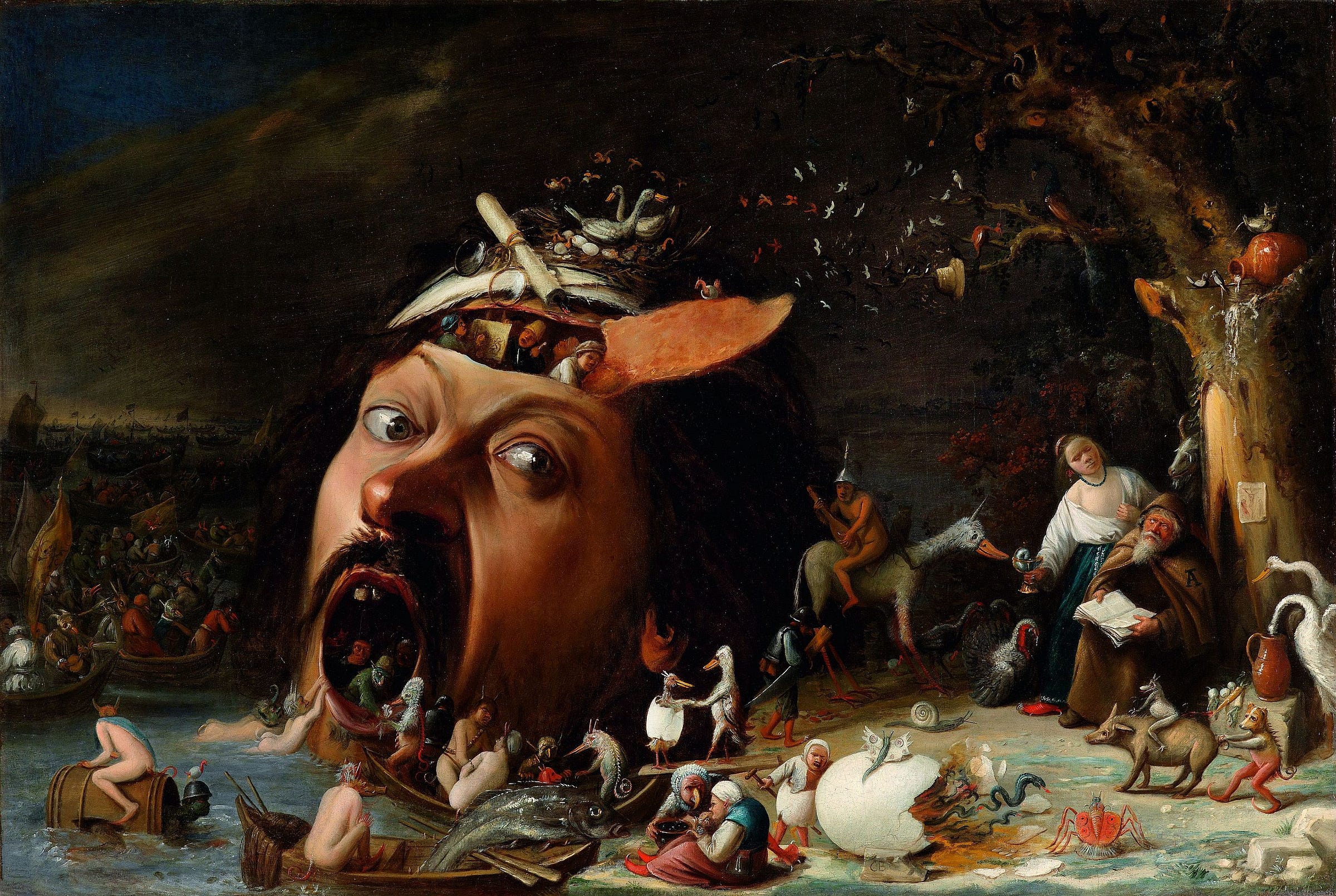


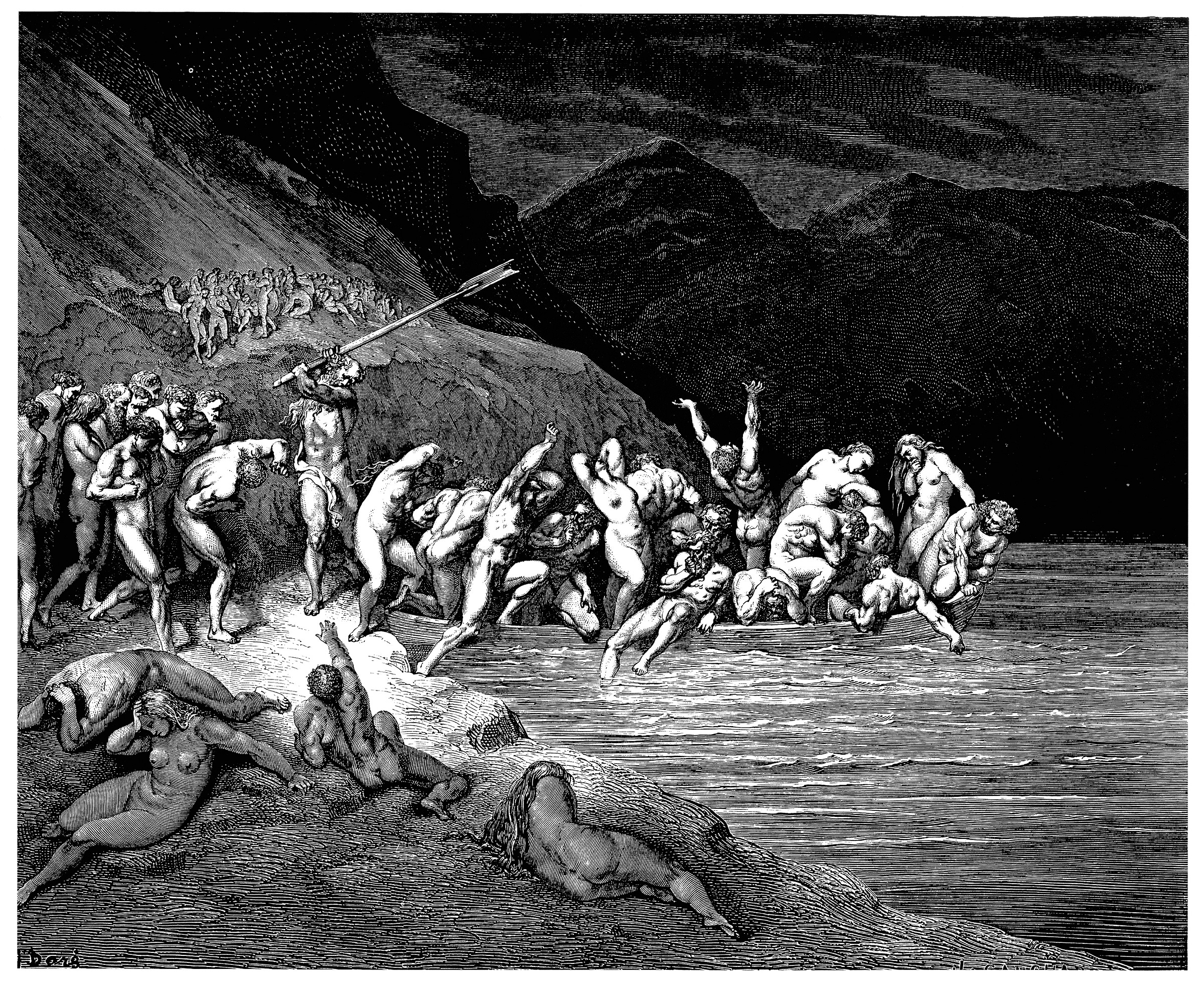






Just starting in to read, but before I forget (again), I wanted to note how gorgeous Luana Montebello’s drawings are!
"I. Dante’s first experience of Hell is not through sight but through sound.
Dante’s first experience in the ‘timeless air’ and ‘starless skies’ is entirely auditory. He can hear them, he can even smell them, but he is too blind to see them."
Working in many hospital intensive care units, we would encourage loved ones to speak to the unconscious or dying patient. It is belived that hearing is the last living sense to fail. Here we meet it first.
Also, smell is the oldest.